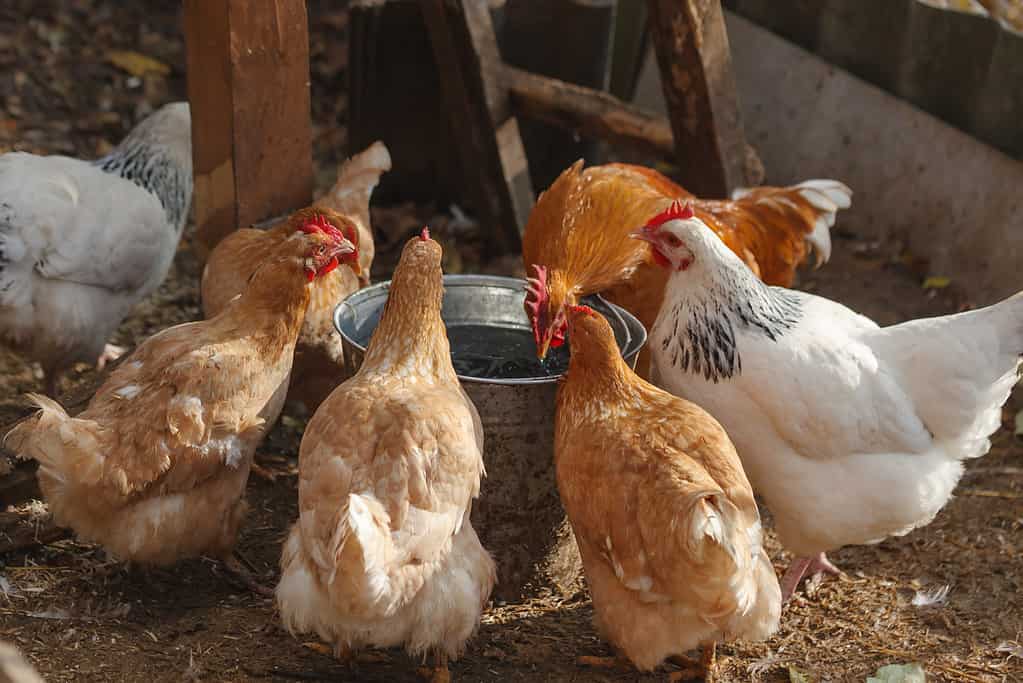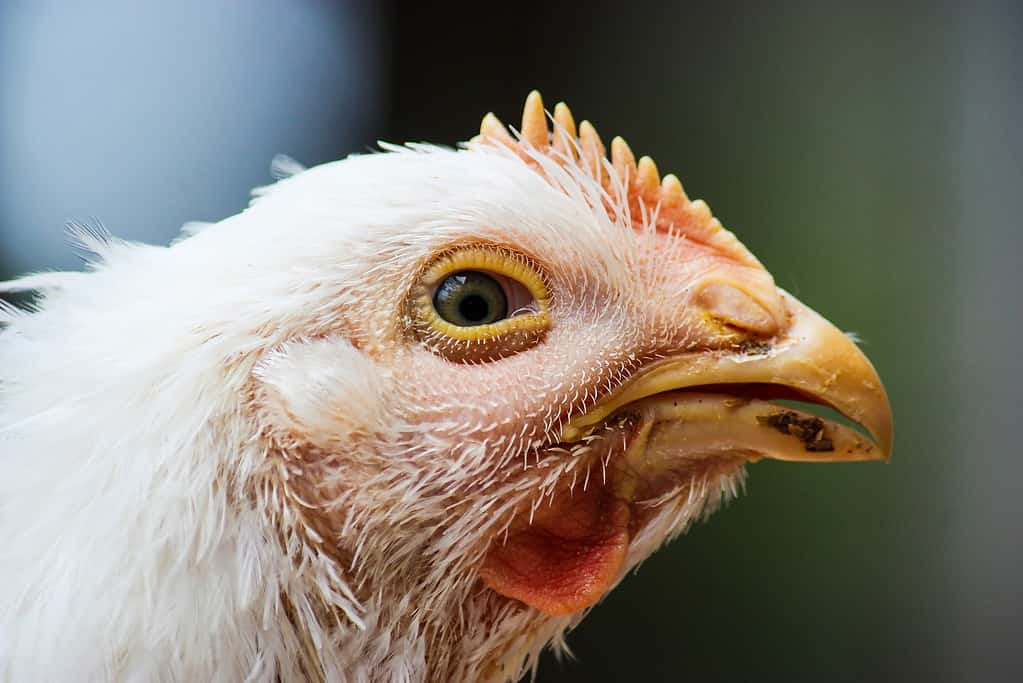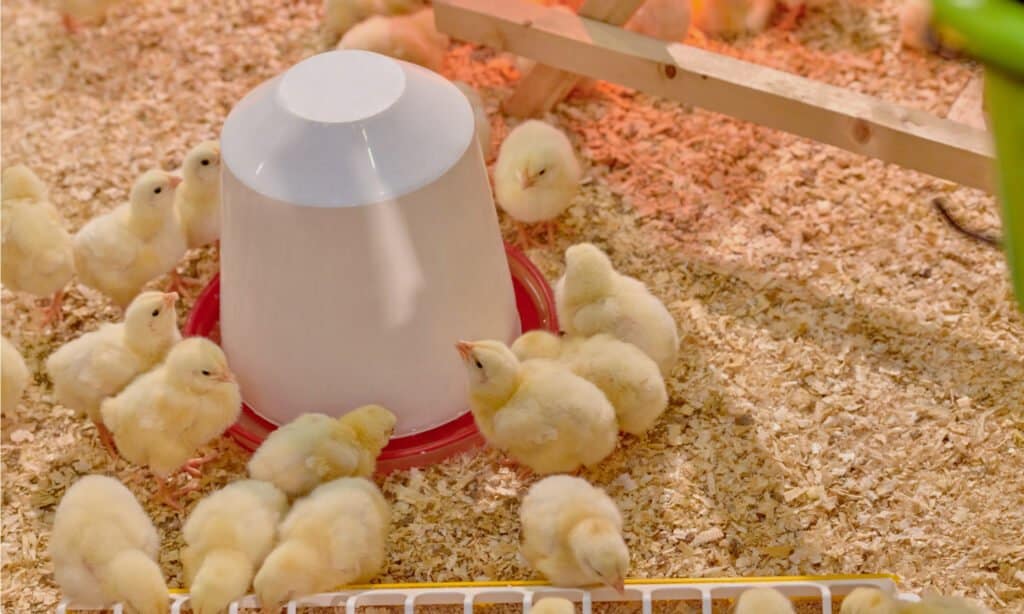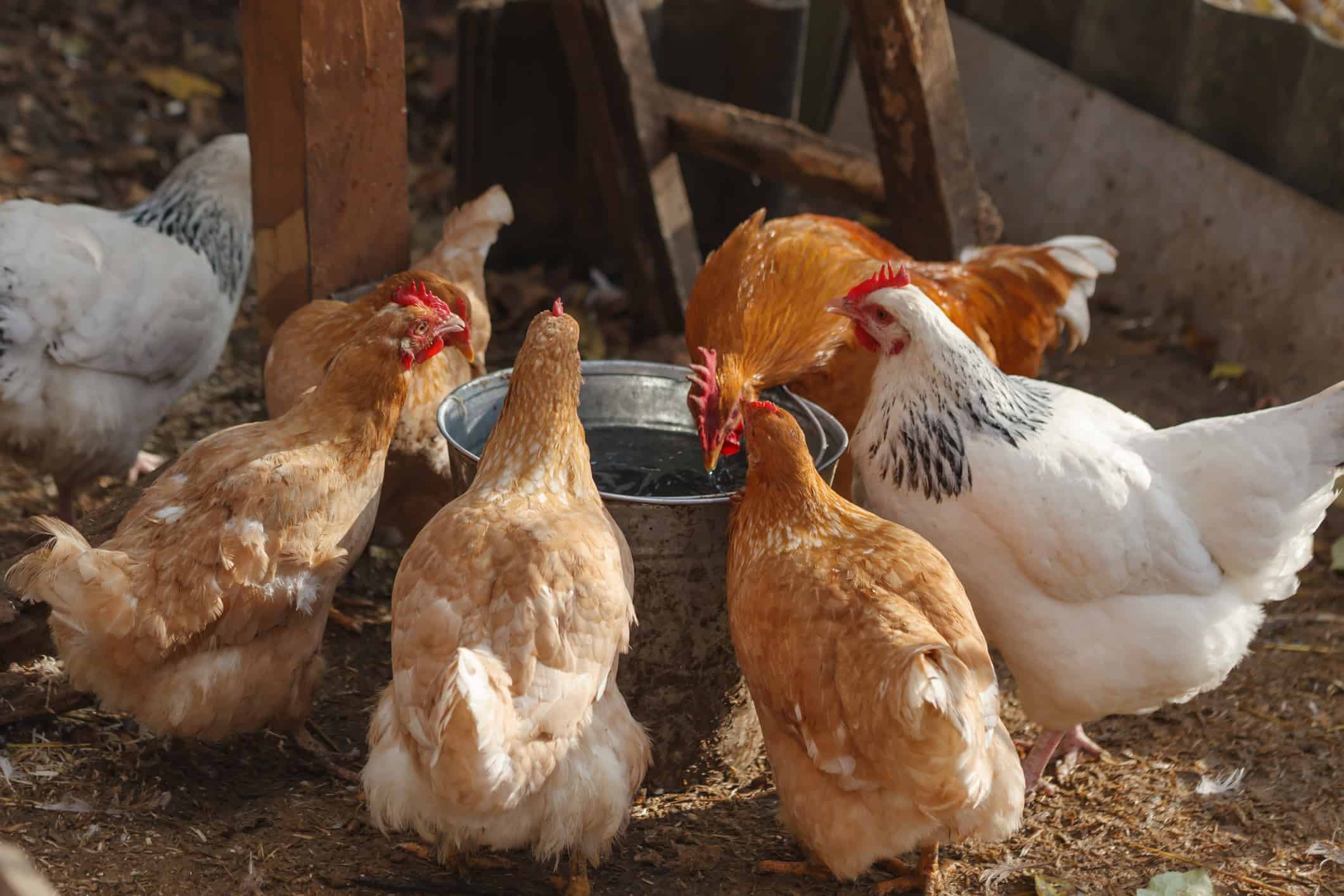Most living organisms need access to water in one form or another in order to survive. Chickens are no exception. From shortly after they hatch chickens need steady access to clean, fresh water. If they don’t have it, they will dehydrate and die. Several factors, including the age and condition of the chicken, the ambient temperature, and even the condition of their shelter can affect how long a chicken may survive without water. So, how long, then, can chickens go without water? In general, in relatively comfortable temperatures and without extenuating circumstances, chickens can survive without water for about 48 hours at the most. However, some may perish in as little as six hours, while in the perfect conditions, some may live as long as three days.

Chickens need around one pint of water per chicken per day; more if it is hot outside.
©Olesya Andreeva/ via Getty Images
What Happens When Chickens Go Without Water?
When chickens go without water for too much time, they will become dehydrated. Dehydration can set in within just a few short hours when a chicken is deprived of water. If the condition persists too long, their symptoms will get worse and worse. Eventually, usually within a span of less than 48 hours, the birds will die.
One of the things that happens when chickens go without water involves their crop. Chickens store food temporarily in their crop, but they need a consistent supply of water to process and digest this food. If they become dehydrated, the food in the crop dries out and may become impacted. They can’t digest this food, and it may get completely stuck. This can kill the bird even if it regains access to water.
A dehydrated chicken may have difficulty breathing. It may appear to be panting or struggling to take a breath. The chicken’s comb and wattle may lose its red color and turn pale. And the bird may suffer from diarrhea.

A lethargic chicken with a pale comb and wattles may be suffering from dehydration.
©Stefano Argenti/ via Getty Images
In order to try to cool off, the bird may hold its wings away from its body, at least until it gets too tired to do so. As the condition worsens, the chicken may become weak and lethargic. It may even go limp and unresponsive or completely lose consciousness. Chickens suffering from severe dehydration may have seizures before at last succumbing to death.
What Factors Affect Survival?
The amount of time that chickens can go without water varies. Both internal and external conditions can alter the time it takes for a chicken to get dehydrated, become sick, and die from a lack of water. Here are some of the factors that affect survival.
Age of the Chicken
Baby chickens are especially vulnerable to dehydration. If newly hatched chickens go without water for just a few hours, they will likely die. Older chicks and adult birds can last longer. Old chickens might die more quickly than younger, healthier birds.

Baby chickens can die in as little as six hours without access to water.
©Gedeminas777/Shutterstock.com
Health of the Chicken
Any health issue a chicken has will likely exacerbate the effects of dehydration. A chicken in the middle of molting and growing new feathers needs more water and can become dehydrated more quickly than other birds. Likewise, if a chicken is already suffering from parasites or an infection, they are at enhanced risk of dehydration.
Ambient Temperature
You probably already know how much more quickly you dry out and feel thirsty on a hot summer day than in cool, winter temperatures. Chickens also dehydrate much more quickly in the heat than when it is cool. A chicken may die in less than 24 hours without water when it is hot outside. But they may live up to 72 hours in the cold without a drink.
Season
Temperatures aren’t the only seasonal factors that affect how long a chicken can go without water. Many chickens molt and lay eggs on a seasonal schedule. Both of these activities put extra stress on a chicken’s body and require more water. If the chicken is denied access to water in the winter, when it may not be molting or laying regularly, the bird may be able to survive longer.
Type of Shelter Provided
Chickens with lots of shady places to rest and plenty of ventilation have an advantage over birds that are stuck in hot, overcrowded coops or pens with little to no shade. A bird with no refuge from the heat will likely die sooner without water than one that is at least able to get under the shade.
How Much Water Do Chickens Need?
Chickens need about 500 ml, or a little over 1 pint of water per chicken, per day. So, if you have eight chickens, you need to provide at least a gallon of fresh, clean water every day. This amount does not account for rapid evaporation on hot days or partial freezing on cold days. It also does not take into consideration an ornery bird that likes to splash in the water and ruin things for everyone.
Consider using the measure above measure as a baseline. Give your birds at least 1 pint of water per chicken every day, but make sure to refill and freshen their water regularly in case that amount is not enough. Remember that in hot weather, the amount of water a chicken needs each day may increase dramatically. Provide your chickens with at least 1 quart of fresh water per bird per day when temperatures reach the 90s or above.
Can Chickens Drink Too Much Water?
Healthy chickens will regulate the amount of water they drink based on their need. Generally, you can safely provide your chickens with an excess of water and they will just consume what they actually need based on their thirst. However, make sure you do not feed your chickens overly salty or processed treats. These foods can cause your birds to experience excess thirst and may result in drinking too much water.
What Kind of Water Source Is Best?
Most breeds of chickens do just fine with pans of water. Others, particularly those ornamental breeds with elaborate feathers around their face, such as Polish chickens and Sultan chickens, may do much better with bottle systems. Chickens that live in cold areas can live a little longer without dying from a lack of water, but they might benefit from having a heated water source so that their drinking water does not freeze solid.
Make sure whatever water sources you provide are kept clean, fresh, and away from areas that may draw pests or predators. Some owners suggest putting water sources inside the coop. Others suggest putting water in secure locations outside the coop, to prevent damp conditions where the chickens roost.
Do Chickens Need Water at Night?
Like other diurnal animals, chickens sleep during the night and their metabolic needs slow down. They typically do not need access to water at night after they have gone to roost. But make sure to give them fresh, clean water first thing in the morning.
Can Chickens Recover from Dehydration?
If you have accidentally deprived your chicken of water, and they have become sick or dehydrated, they may be able to recover. If your bird is suffering from heat stress, you can help it by placing it in a pan of cool water, only up to the neck, and watching over it until it cools back down. Feed the chicken wet feed to help with the dry food that may be stuck in their crop. Give it access to plenty of water and try to keep it cool.
Give your chicken time to rest and recover and expect that it will take a while for them to get back to normal. Dehydrated hens may not lay any eggs for at least two weeks after they’ve been given back access to water. Chickens of both sexes may go into an unexpected molt. And they might take some time to start feeling like crowing and foraging again.
Be sure to seek veterinary assistance if your chickens become dehydrated and you are concerned about their health. Even if they are still alert when you discover their condition, they may still die without proper treatment. The best thing you can do is prevent dehydration from happening in the first place. Set reminders to water your birds regularly, and keep an eye on any changes in your flock’s water needs.
Thank you for reading! Have some feedback for us? Contact the AZ Animals editorial team.








